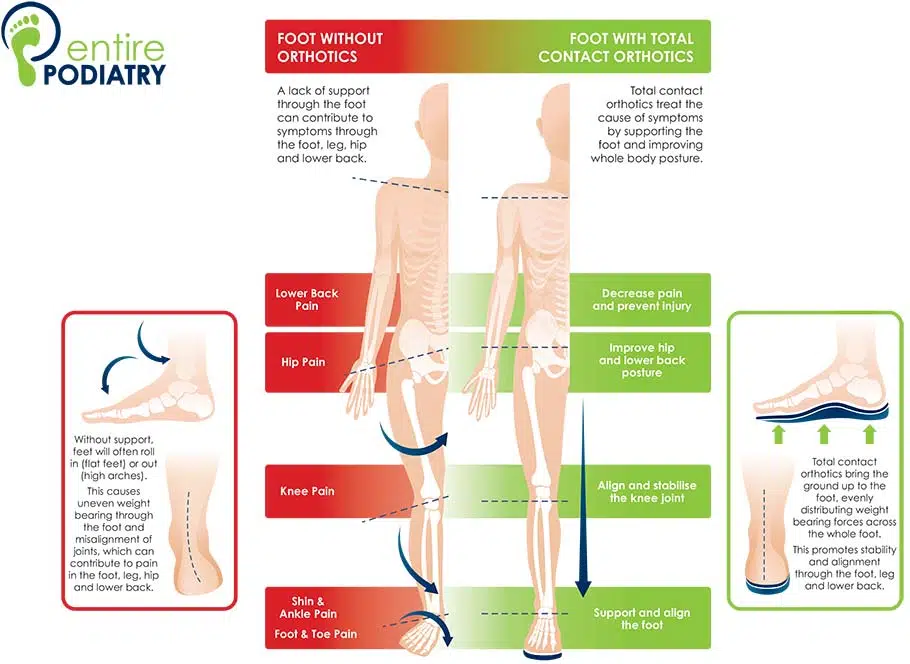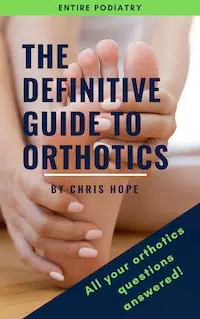What are orthotics?
Orthotics are specially designed innersoles which are worn inside your shoe. Orthotics help to support your feet and correct any biomechanical imbalances which may be the cause of your pain.
Orthotics are generally separated into (3) different types – Custom, and Semi-Custom. At Entire Podiatry we offer both types of orthotics to our patients.
It can be quite confusing understanding the differences between the types of orthotics and which orthotic is best for you. This is why we like to give as much information as possible to patients to help them make an informed decision. This page provides more information about each type of orthotic. At your appointment, your podiatrist will assess your feet and will talk you through the different options available and will give advice on which type of orthotic will best manage your symptoms.
Do I need orthotics?
There are many reasons why someone may benefit from a pair of orthotics. Ultimately, a Podiatry assessment is necessary to determine if you need orthotics.
 Most foot pain is the result of a faulty connection between the bones, ligaments and muscles of the foot. Even the smallest misalignment can result in soreness which can then translate to pain in your feet, legs, hips or lower back. Orthotics will restore the bones, muscles and ligaments to their correct position to help resolve the pain.
Most foot pain is the result of a faulty connection between the bones, ligaments and muscles of the foot. Even the smallest misalignment can result in soreness which can then translate to pain in your feet, legs, hips or lower back. Orthotics will restore the bones, muscles and ligaments to their correct position to help resolve the pain.
Some people with a particular shape to their feet- e.g. a very flat foot or high arches may benefit from orthotics to improve their foot posture, increase comfort levels and reduce the possibility of foot issues and pain developing.
Gait issues such as toe-walking, walking ‘pigeon toed’, or general instability while walking may be corrected through the use of foot orthotics. Orthotics are designed and created after viewing the patient’s gait and a correctly designed device can encourage a preferred gait pattern.
Orthotics can encourage healing of an injury and can reduce the chance of injury recurrence. For example, after an ankle sprain you may benefit from a pair of foot orthotics to increase ankle stability thereby reducing the possibility of re-spraining.
Foot ‘deformities’ may also be addressed with the use of orthotics. For example, there are features that can be built into orthotics to help control and slow the development of foot problems such as bunions and hammer/claw toes.
Orthotics may also be useful to slow the development of problematic corns and callus and foot ulcerations by transferring pressure away from these ‘high-pressure’ and painful areas.
Research has shown that a pair of orthotics worn in conjunction with a good pair of shoes may assist in improving balance and reduce the risk of falls, particularly in the elderly population.
If you believe you may benefit from a pair of orthotics, simply make and appointment at Entire Podiatry for an honest assessment of your feet and your requirements.
Do orthotics work?
Yes. Foot orthotics work by supporting and improving alignment of the feet, which promotes better posture and can also relieve pain further up the body.
Without support, feet will often roll in (flat feet) or out (high arches), which causes uneven weight-bearing through the feet. This uneven weight-bearing and misalignment of joints can result in pain not only in the feet and legs but also higher up the body in the hips and lower back.
No two pairs of custom foot orthotics are the same. Each orthotic is designed based on your specific foot shape. There are numerous variations and additions that can be built in to the orthotic based on the individual’s needs. This customisation is highly effective in providing the correct support and appropriate biomechanical intervention required to resolve each individual’s issue.
Are orthotics good for your feet?
Yes, but only if you are fitted correctly by a qualified podiatrist. There are a range of orthotics available, but custom foot orthotics (also known as total contact orthotics) are the most effective at hugging the arches of the feet. The benefits of custom foot orthotics are that they are custom made to suit your individual foot, evenly distributing weight bearing forces across the whole foot. Choosing a customised orthotic device means the podiatrist can design the orthotics in a highly specific and customised way based on your individual requirements to resolve your specific issues.
Pros and cons of custom orthotics
The benefits of wearing orthotics can be widespread across the body. Orthotics are much more than just raising and supporting the arch of the foot. They also improve your foot and lower limb alignment which reduces stress across the joints within your feet, ankles, knees, hips and lower back. This improved alignment assists in restoring optimal function.
Benefits of orthotics may include:
- Supporting the arch of the foot
- Improving foot posture
- Protecting the foot post-surgery. Orthotics are often used post-surgery to help reduce the recurrence of foot deformities
- Spreading the pressure evenly across the foot. For example, excessive pressure is often carried at the heads of our metatarsal bones i.e. the joints under our toes. When these fragile joints are overloaded it can lead to a number of conditions such as joint capsulitis, bursitis, neuroma or callus and corns. Custom foot orthotics are designed to reduce the pressure under these painful areas which will subsequently reduce the pain.
- Supporting and facilitating healing of an injury e.g. tendinopathy or a stress fracture
- Encouraging an optimal gait pattern
- Increasing cushioning
- Improving balance
- Improving shock absorption
- Stabilising the joints within the foot providing relief from conditions such as arthritis
When deciding to invest in a pair of custom foot orthotics, it is important to consider the type of shoe that they will be worn with. Orthotics will need to be worn with a shoe that accommodates and compliments the orthotic device. This means that not every shoe may be worn with orthotics. However, the range of orthotic friendly shoes, including sandals and open-toed footwear continues to grow. There are more and more fashionable footwear brands that are able to accommodate orthotics without sacrificing style. Talk to our podiatrists about what type of footwear will be best suited to you and your orthotics.
Orthotics can take some time to get used to and may even feel a little bit awkward or uncomfortable initially. This usually resolves after a few weeks of wearing the devices in slowly and gradually. At Entire Podiatry it’s important to us that you feel comfortable and are happy with your orthotics. If you are noticing any issues with the orthotics, please let us know and we can provide any modifications or adjustments to these to ensure the perfect feel.





